Christopher Reeve, the Superman who became a hero after near-fatal accident
A documentary showcases the career of the first actor to achieve stardom by portraying a superhero, two decades after his death at the age of 52
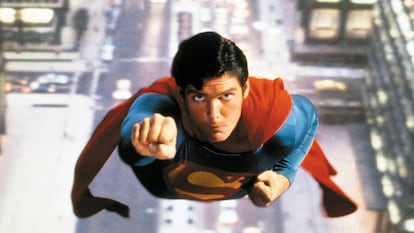

He was the first major star of superhero cinema, marking the dawn of the modern era with his portrayal of Superman in 1978. Yet, despite embodying the invincible Man of Steel, Christopher Reeve would later spend the final years of his life in a motorized wheelchair, reliant on a mechanical respirator after a life-altering horse-riding accident in 1995.
This Thursday, October 10, marks the 20th anniversary of his death. Super/Man: The Christopher Reeve Story, a biographical documentary produced by his three children, delves into Reeve’s journey as an activist for people with paralysis, shedding light on the profound challenges and contradictions in his career and personal life.
Since its premiere at the Sundance Film Festival, the documentary has left a lasting emotional impact on viewers. Reeve’s death was followed by further heartbreak: his wife, Dana, passed away from lung cancer just 18 months later, and his best friend, Robin Williams, tragically took his own life a decade after that.
The most ironic aspect of the accident that left Reeve paraplegic on May 27, 1995, is that he was allergic to horses. He first took up riding for his role in Anna Karenina (1985), quickly developing a passion for it. From then on, he took medication to manage his allergy, allowing him to add horse riding to his list of sports, which already included skiing, tennis, and sailing. As an aviator, he even crossed the Atlantic solo twice.
Reeve’s story, as portrayed in the documentary, exudes a deep sadness. The child of divorced parents — both of whom remarried and had other children — he spent much of his life striving for the approval of his father, F. D. Reeve, a poet, academic, and translator of Russian literature, who championed elite culture. Christopher’s relentless pursuit of his father’s pride found its closest moment of success when he announced he would star in Superman. His father, mistakenly thinking it was George Bernard Shaw’s Man and Superman, opened a bottle of champagne.
Now, in 2024, few remember Reeve Sr., but his son remains an enduring pop culture icon.
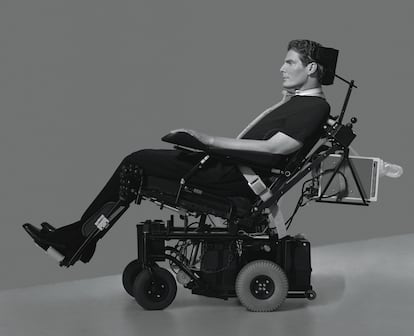
However, after studying at Princeton and Cornell, Reeve did not seem destined for the world of blockbuster sagas. He attended the prestigious Juilliard School, where he shared a room with his future best friend, Robin Williams, and made his stage debut alongside Katharine Hepburn. At the time, he was performing My Life off-Broadway with Jeff Daniels and William Hurt when his agent called about an audition in London. Hurt advised him not to compromise his integrity, but Reeve recalled a piece of advice from the legendary John Houseman at Juilliard: “It is very important to become a serious classical actor. Unless of course, they offer you a load of money to do something else.” Houseman, perhaps thinking of his own struggles in film alongside his friend Orson Welles, could never have imagined that this advice would pave the way for the Reeve-Superman legend.
Reeve flew to London for the audition and returned the next day. Director Richard Donner later recalled being struck by Reeve’s presence and the sense that he could really fly. Neither Hollywood, Donner, nor Reeve himself — who, while filming in London, had started dating a modeling agent he met in the dining hall queue at Pinewood Studios — could have anticipated what Superman would mean for pop culture.
Soon, a sequel followed. Despite Reeve’s efforts to distance himself from the role by seeking out projects like Monsignor, The Bostonians, Street Smart, The Remains of the Day, Switching Channels, and Village of the Damned, he could never fully escape the shadow of Clark Kent.
Superman didn’t just define Reeve — it consumed him. And he was one of the first actors to take the role seriously. For the first film, Reeve trained intensively with David Prowse, the man behind the Darth Vader suit, to bulk up for the part. During filming, he sought out Gene Hackman, who played Lex Luthor, to rehearse, but Hackman mocked him, saying he only wanted to work with Marlon Brando, who portrayed Superman’s biological father, Jor-El. Brando’s involvement was even more indifferent — he filmed his scenes in just two days, collected his paycheck, and left.
Reeve’s fate seemed inextricably tied to kryptonite. He found himself starring in Superman III, an ironic take on the character that he never agreed with, followed by the disastrous Superman IV, a low-budget production he was deeply disappointed by. Despite these frustrations, Reeve cherished the role, believing he was playing two characters: Superman and the version of Superman pretending to be Clark Kent, a layered performance he took great pride in constructing.
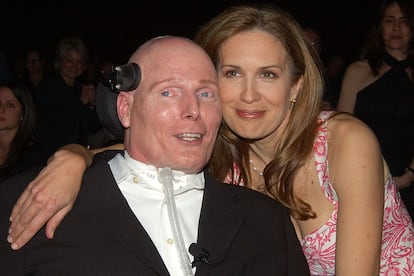
Then came 1995. By that time, Reeve had separated from his first partner, leaving behind two children in London. In 1987, he met actress Dana Morosini, whom he married five years later, and they had a third child. This child has no memory of his father ever walking. In the documentary, Reeve’s children speak of two long shadows that hung over their father: his fear of commitment (he never married his first partner and waited five years to marry Morosini) and, despite denying his father’s emotional distance, Christopher exhibited similar behavior toward his own family. Obsessed with sports and highly competitive, he only spoke calmly with them on a deeper level after he became quadriplegic and bedridden.
When Reeve awoke after the horse-riding accident — which, as his youngest son recounts, could have been either fatal or only a bad fall with just a shift of one centimeter — he felt that he hadn’t just destroyed his own life, but everyone’s around him. In the documentary, Reeve himself narrates parts of his story, as the filmmakers use excerpts from his audiobooks to capture his voice. He explains how he was saved in a crucial moment when he heard Dana say, “You are still you, and I love you.” Paralyzed from the neck down, he had lost all physical sensation and needed a respirator. His own mother asked for him to be taken off life support, but after days teetering between life and death, he survived. The first person to make him laugh during that dark period was Robin Williams, who burst into his hospital room dressed as a Russian proctologist.
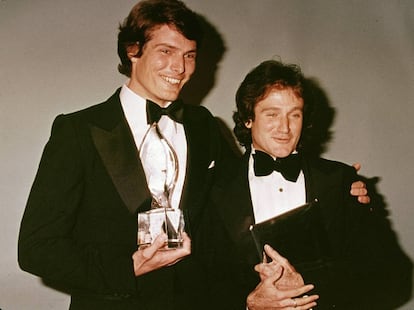
“I am not a hero, never have been, never will be,” Reeve said. Yet just months later, he appeared at the 1996 Oscars in a wheelchair, becoming a symbol of perseverance. From that moment on, Dana Reeve dedicated herself to supporting him emotionally while coordinating his medical care. Meanwhile, Christopher focused on a dual mission: combating the condescension he often faced due to his condition and raising awareness for the thousands of paralyzed Americans who lacked his financial resources. He also sought funding for his foundation, which aimed to promote cutting-edge research and treatments, particularly those involving stem cells.
One powerful result of this battle was a commercial in which Reeve appeared walking. The foundation’s director explained that Reeve wanted to provoke thought, as he refused to wallow in self-pity. He never believed in the concept of “false hope,” insisting that hope is never false. This was the “Man” in Superman, the part of him that transcended admiration and turned him into a legend.
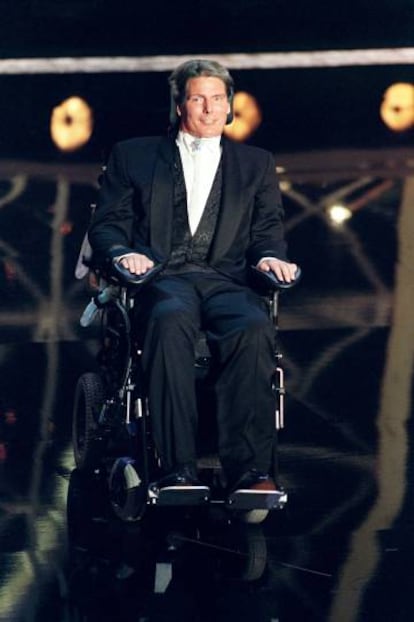
For a decade, Reeve continued working in film, including starring in a remake of the Hollywood classic Rear Window, and directed two more films, all with clear social themes. On each anniversary of his accident, Robin Williams would host a party with a different chef to celebrate Reeve’s life. There was some improvement in Reeve’s mobility, and during this time, Dana left their family home in Bedford, New York, to work for a musical producer in California. But on the night of October 9, 2004, Reeve suffered multiple organ failure, fell into a coma, and passed away the following day, just as Dana entered his hospital room.
What follows is an epilogue that adds even more sorrow. Weeks after Reeve’s funeral, when Dana returned to rehearsals, she complained of a persistent cough and soon after, severe back pain. She was diagnosed with lung cancer, which claimed her life in March 2006. In the documentary, Matthew — Reeve’s eldest son — reflects on the tragic series of losses: “William [Reeve] lost his father, his grandmother, who he was very close to, and his mother in just 18 months. It was incredibly hard.”
Actress Glenn Close, a family friend, voices another sentiment that lingers with viewers: “I always felt that if Chris was still around, Robin would still be alive.”
Sign up for our weekly newsletter to get more English-language news coverage from EL PAÍS USA Edition
Tu suscripción se está usando en otro dispositivo
¿Quieres añadir otro usuario a tu suscripción?
Si continúas leyendo en este dispositivo, no se podrá leer en el otro.
FlechaTu suscripción se está usando en otro dispositivo y solo puedes acceder a EL PAÍS desde un dispositivo a la vez.
Si quieres compartir tu cuenta, cambia tu suscripción a la modalidad Premium, así podrás añadir otro usuario. Cada uno accederá con su propia cuenta de email, lo que os permitirá personalizar vuestra experiencia en EL PAÍS.
¿Tienes una suscripción de empresa? Accede aquí para contratar más cuentas.
En el caso de no saber quién está usando tu cuenta, te recomendamos cambiar tu contraseña aquí.
Si decides continuar compartiendo tu cuenta, este mensaje se mostrará en tu dispositivo y en el de la otra persona que está usando tu cuenta de forma indefinida, afectando a tu experiencia de lectura. Puedes consultar aquí los términos y condiciones de la suscripción digital.








































